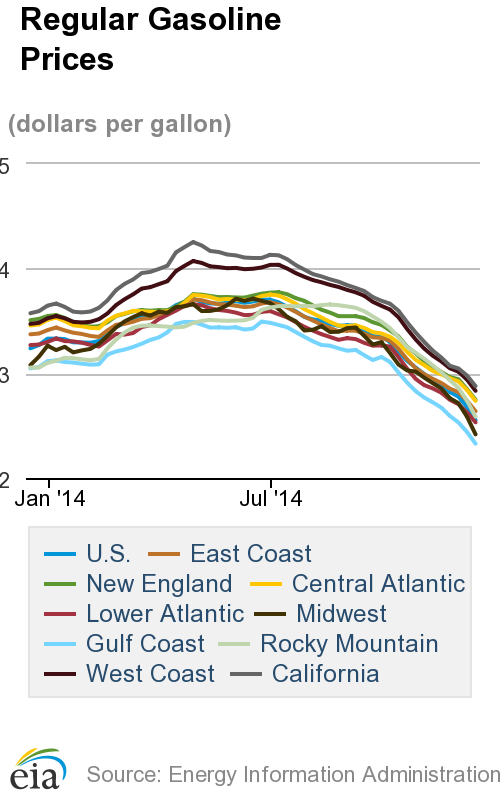 Normally sticker shock at the gas pump is not a good thing, but these days, the price of gas is dropping at the pump. It’s a welcome sight for most people, and one cause is the fracking boom here in the United States.
Normally sticker shock at the gas pump is not a good thing, but these days, the price of gas is dropping at the pump. It’s a welcome sight for most people, and one cause is the fracking boom here in the United States.
Drivers have seen the change at the pump, with gasoline prices across the country dipping well below $3 per gallon. According to the U.S. Energy Information Administration (EIA), the price for regular gasoline in the United States has fallen for 11 consecutive weeks to just $2.55 per gallon as of December 15, down $1.16 per gallon from its 2014 peak in late April and the lowest price in more than 5 years. In fact, we saw $2.45 per gallon at the pumps here in Georgia this week. And gas prices are forecast to drop even lower in 2015.
To what do we owe this boon? Gasoline prices are dropping because of lower crude oil prices, which the EIA states accounts for about two-thirds of the price Americans pay for a gallon of gasoline. On July 1, oil was valued at $106.06 per barrel of oil. Only 5 months later, the price has plummeted to $65.89 per barrel.
So, why the plummeting oil prices? First, U.S. oil production has increased considerably in recent years due to horizontal drilling and hydraulic fracturing, or fracking. Fracking is a drilling technique used to extract oil or natural gas from shale formations deep underground that would be inaccessible using conventional methods. While protests against fracking have grown in recent years, the opposition is being outpaced by the number of fracking wells starting production across the country. Moreover, the productivity of individual wells has also been increasing over time as drilling companies improve their precision and efficiency, as shown in the EIA charts below. The chart on the left shows oil production per rig in barrels per day (bbl/d), while the chart on the right shows natural gas production per rig in million cubic feet per day (Mcf/d).
Second, as the influx of oil from the United States has sent global oil prices into a freefall, the Organization of Petroleum Exporting Countries (OPEC) has recently taken an interesting position. Instead of cutting production—a move that would firm up the price and even begin to raise it—OPEC is maintaining current production levels and taking a wait-and-see approach.
If the price of oil continues to dip, fracking could become cost-prohibitive for many companies, especially smaller businesses. At the very least, companies may abandon higher-risk areas and focus less on research and development, concentrating instead on developing areas with proven yields and minimal opposition. OPEC members, on the other hand, can manufacture and distribute oil more inexpensively.
The cost to produce a barrel of oil varies widely across the globe. Some OPEC members can produce one barrel of oil for about $30. That’s far below the $78 for a barrel produced in the Arctic. Fracking has allowed gas companies to produce a barrel for about $62 on average, according to Rystad Energy, an oil and gas consulting company.[1] But it’s not just that fracking for shale oil and gas is a cost-intensive industry, requiring considerable capital investments and extensive drilling; critics also claim that the productivity of fracked wells declines much more quickly than conventional wells. This has some analysts worrying that the fracking boom may really be a bubble that could burst like the dot-com bubble did in the early 2000s.
If the price of oil stays relatively low, companies might start drilling fewer wells. However, companies such as Elevation Resources do not see prices getting so low that production is halted. For now, companies will continue to invest in fracking and other techniques for the long-term payoff.
Return to the blog for the latest on the fracking industry and how it is affecting oil prices and the economy.
[1] Jeff Brady. “Falling Oil Prices Make Fracking Less Lucrative.” NPR, November 4, 2014. Accessed December 17, 2014 at http://www.npr.org/2014/11/04/361204786/falling-oil-prices-make-fracking-less-lucrative.







Recent Comments